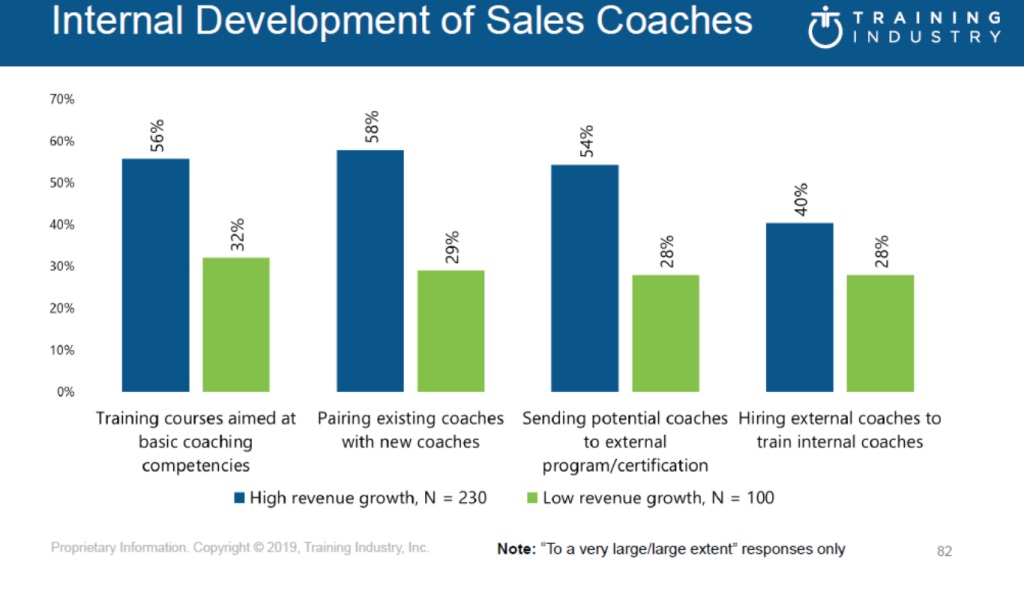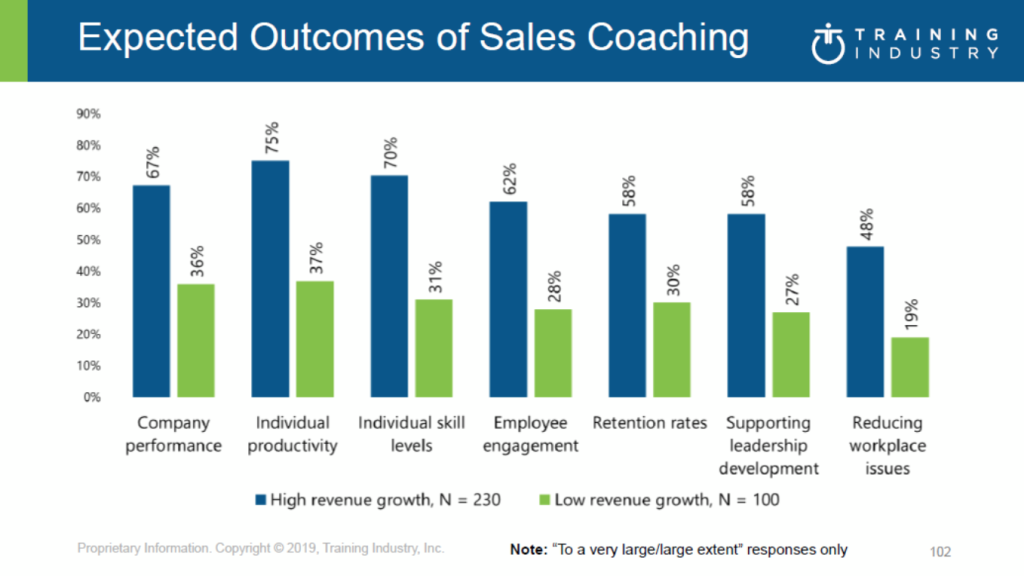New Research Reveals How High Growth Companies Develop Sales Coaches
Editor's Note: This guest post was written by Julie Thomas, CEO of ValueSelling Associates
Coaching is a critical component of continuous improvement. That’s why the best of the best have great coaches – from Hollywood celebrities and Olympic athletes to CEO billionaires and singers on The Voice. Sales managers and reps need great coaches too.
Sales Coaching vs. Managing
Coaching and managing are two different things. Sales coaching is a process of developing people to reach their next level of excellence and performance by helping them master skills and overcome obstacles. Managing, on the other hand, is about delivering results and getting things done. In sales that typically means achieving or exceeding revenue numbers. However, sales managers have multiple roles and coaching is often one of them.
“Sales coaching is a key pillar of sales management—it is only one of the many roles of this job that sales managers have to perform.”
Qualifications for an effective sales coach
Given the importance of sales coaching, why do so many companies either promote a sales rep into the role of a sales coach or ignore this critical skillset?
Just as we acknowledge that successful sales people must master certain skillsets, successful sales coaches must master specific coaching skillsets. Not every high performing sales rep will immediately become a good coach when promoted. Many times, your best sales reps are lousy coaches. Coaching involves observation, assessment, teaching and effectively communicating feedback. While coaching often involves role modeling to teach, it is not effective when the coach takes over to get the job done themselves. Can you imagine a world class coach of an athlete, competing instead of the athlete?
It’s essential for sales managers to be trained in order to acquire and master the coaching skill set necessary to help develop their sales reps. The traits of a great sales coach include caring deeply about people, having very high personal standards, and possessing a very high level of proficiency and knowledge in communication, observation, listening and technical skill. Good coaching does not typically happen by accident.
New Research on Sales Coaching
ValueSelling Associates, Inc. and Training Industry, Inc. surveyed 330 U.S. sales professionals from a wide variety of industries to explore the role of sales coaching within business-to-business (B2B) companies. According to the research findings, 67% of companies that have had a formal coaching program in place for three years or more experienced high revenue growth. This study data proves that adoption and effectiveness of sales coaching increases with time.
Here are some of the highlights from the research, and how companies can develop sales coaches.
Top Methods for Developing Sales Coaches
One of the principles I often talk about is that even a coach needs a coach. Coaching is a skill set, and coaches need to refine their skills just as sales reps need to build and refine their skills. Often the sales manager is the coach for sales reps within an organization. And that coach has to possess the same expertise that they want the sales reps to have. It’s important to provide your entire customer-facing team with a common sales methodology, skill set and set of tools that everyone can easily understand and use consistently. Coaching is all about skill and behavior; good coaches know what skills and behaviors they expect to observe.
There are a number of ways to build coaching competencies. The sales manager might hire others to train the team on coaching or develop a mentoring program.
According to our research, here are the top four methods high growth companies use to develop sales coaches within their organization:
- 58% of high revenue growth companies pair existing coaches with new coaches
- 56% rely on training courses aimed at basic coaching competencies
- 54% send potential coaches to external programs or certification courses
- 40% hire external coaches to train internal coaches
Get Set to Increase Revenue by Developing Valuable Sales Coaches
Great sales managers know that revenue goals aren’t going to be met unless they invest in developing their teams. There is a cause and effect relationship between developing your people and achieving your results.
When you focus on developing sales people and provide them with the training and skills to improve, your business will experience many benefits. When sales people, especially the Gen Z and Millennial generations, receive great coaching they feel like the company they work for cares about providing them with professional development and this is a reason for them to stay. In sales, the longer the rep stays at a particular company and within a territory the better relationship they develop with clients and the more effective they’ll be.
Our research study shows that high performing companies expect significant outcomes from their investment in sales coaching:
- 75% of high performing companies expect individual productivity to increase
- 70% expect individual skill levels to advance
- 67% anticipate an increase in company performance
- 62% look to more employee engagement
- 58% anticipate increased retention rates
- 58% expect supporting leadership development
- 48% look to reducing workplace issues
A coaches’ role is to optimize performance by providing perspective, constructive, truthful and specific feedback, positive guidance, and discipline to practice core skills. Coaching feedback is developmental rather than evaluative. At the heart of coaching is questioning and thoughtful inquiry, collaboration and getting buy-in. In turn, the coachable sales rep must have insight to self-assess their own performance, and be open to feedback, constructive correction, and recognition. Often the best part of the coaches job is recognition and as Ken Blanchard puts it “Catch them doing something right.”
It’s important for both sales managers and sales reps to realize that even when they are at the top of their game, it is difficult to maintain that level of performance by yourself. No one can be successful long term, alone and in a vacuum. Success requires a team effort.
For a coaching program to work, businesses need to have patience and invest in a formal coaching program for a minimum of two to three years. Building proficiency in any new skillset takes time. Our new research findings substantiate that adoption and effectiveness of sales coaching increases with time. More than two-thirds of companies that participated in our study had a formal coaching program in place for three years or more and experienced high revenue growth. Your company can benefit from increased revenue too by investing in a valuable sales coaching program.
For more on the latest trends in the sales industry, subscribe to the LinkedIn Sales Blog.
Topics: Sales trends
Related articles







